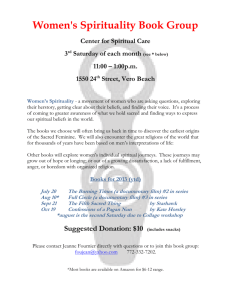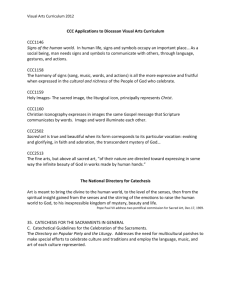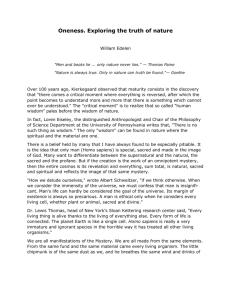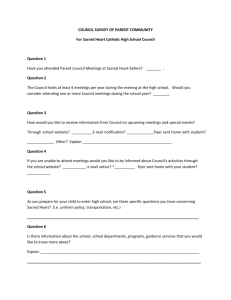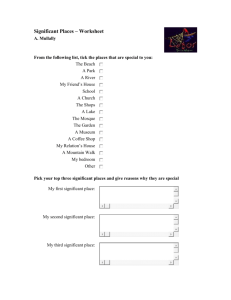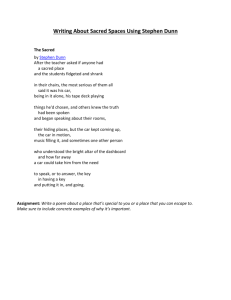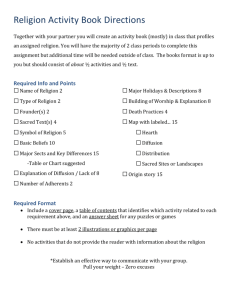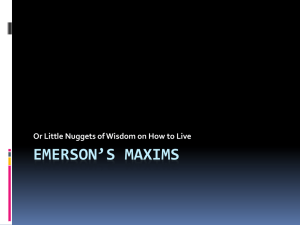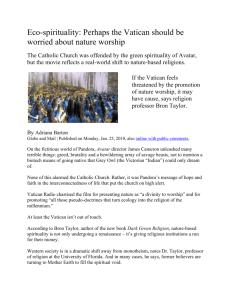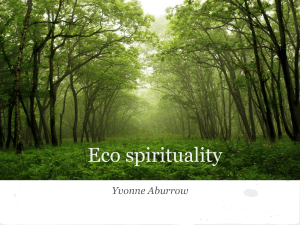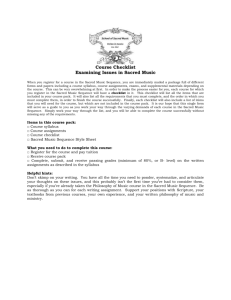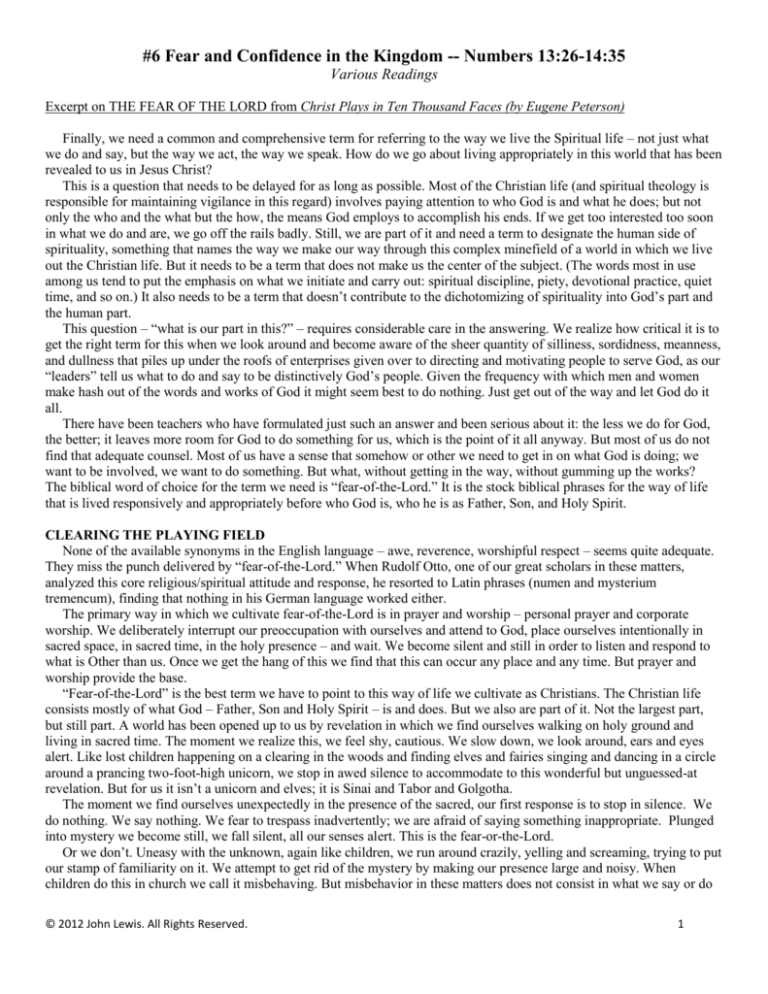
#6 Fear and Confidence in the Kingdom -- Numbers 13:26-14:35
Various Readings
Excerpt on THE FEAR OF THE LORD from Christ Plays in Ten Thousand Faces (by Eugene Peterson)
Finally, we need a common and comprehensive term for referring to the way we live the Spiritual life – not just what
we do and say, but the way we act, the way we speak. How do we go about living appropriately in this world that has been
revealed to us in Jesus Christ?
This is a question that needs to be delayed for as long as possible. Most of the Christian life (and spiritual theology is
responsible for maintaining vigilance in this regard) involves paying attention to who God is and what he does; but not
only the who and the what but the how, the means God employs to accomplish his ends. If we get too interested too soon
in what we do and are, we go off the rails badly. Still, we are part of it and need a term to designate the human side of
spirituality, something that names the way we make our way through this complex minefield of a world in which we live
out the Christian life. But it needs to be a term that does not make us the center of the subject. (The words most in use
among us tend to put the emphasis on what we initiate and carry out: spiritual discipline, piety, devotional practice, quiet
time, and so on.) It also needs to be a term that doesn’t contribute to the dichotomizing of spirituality into God’s part and
the human part.
This question – “what is our part in this?” – requires considerable care in the answering. We realize how critical it is to
get the right term for this when we look around and become aware of the sheer quantity of silliness, sordidness, meanness,
and dullness that piles up under the roofs of enterprises given over to directing and motivating people to serve God, as our
“leaders” tell us what to do and say to be distinctively God’s people. Given the frequency with which men and women
make hash out of the words and works of God it might seem best to do nothing. Just get out of the way and let God do it
all.
There have been teachers who have formulated just such an answer and been serious about it: the less we do for God,
the better; it leaves more room for God to do something for us, which is the point of it all anyway. But most of us do not
find that adequate counsel. Most of us have a sense that somehow or other we need to get in on what God is doing; we
want to be involved, we want to do something. But what, without getting in the way, without gumming up the works?
The biblical word of choice for the term we need is “fear-of-the-Lord.” It is the stock biblical phrases for the way of life
that is lived responsively and appropriately before who God is, who he is as Father, Son, and Holy Spirit.
CLEARING THE PLAYING FIELD
None of the available synonyms in the English language – awe, reverence, worshipful respect – seems quite adequate.
They miss the punch delivered by “fear-of-the-Lord.” When Rudolf Otto, one of our great scholars in these matters,
analyzed this core religious/spiritual attitude and response, he resorted to Latin phrases (numen and mysterium
tremencum), finding that nothing in his German language worked either.
The primary way in which we cultivate fear-of-the-Lord is in prayer and worship – personal prayer and corporate
worship. We deliberately interrupt our preoccupation with ourselves and attend to God, place ourselves intentionally in
sacred space, in sacred time, in the holy presence – and wait. We become silent and still in order to listen and respond to
what is Other than us. Once we get the hang of this we find that this can occur any place and any time. But prayer and
worship provide the base.
“Fear-of-the-Lord” is the best term we have to point to this way of life we cultivate as Christians. The Christian life
consists mostly of what God – Father, Son and Holy Spirit – is and does. But we also are part of it. Not the largest part,
but still part. A world has been opened up to us by revelation in which we find ourselves walking on holy ground and
living in sacred time. The moment we realize this, we feel shy, cautious. We slow down, we look around, ears and eyes
alert. Like lost children happening on a clearing in the woods and finding elves and fairies singing and dancing in a circle
around a prancing two-foot-high unicorn, we stop in awed silence to accommodate to this wonderful but unguessed-at
revelation. But for us it isn’t a unicorn and elves; it is Sinai and Tabor and Golgotha.
The moment we find ourselves unexpectedly in the presence of the sacred, our first response is to stop in silence. We
do nothing. We say nothing. We fear to trespass inadvertently; we are afraid of saying something inappropriate. Plunged
into mystery we become still, we fall silent, all our senses alert. This is the fear-or-the-Lord.
Or we don’t. Uneasy with the unknown, again like children, we run around crazily, yelling and screaming, trying to put
our stamp of familiarity on it. We attempt to get rid of the mystery by making our presence large and noisy. When
children do this in church we call it misbehaving. But misbehavior in these matters does not consist in what we say or do
© 2012 John Lewis. All Rights Reserved.
1
as such; it is that what we say or do is incongruent with the sacred time and place. Until we know what is going on,
anything we say or do is apt to be wrong, or at least inappropriate.
We all have experiences of finding ourselves in the sacred presence or on holy ground from time to time, however
briefly. The most common of such experiences is being in the presence of a newborn child. Most of us are speechless and
still. We don’t know what to do or say. We are overtaken by the mystery of God-given life. Something deep within us
responds to the sacredness of life, of sheer existence; our response becomes worship, adoration, prayer, awe - the fear-ofthe-Lord.
But there is also something about the sacred that makes us uneasy. We don’t like being in the dark, not knowing what
to do. And so we attempt to domesticate the mystery, explain it, probe it, name and use it. “Blasphemy” is the term we use
for these verbal transgressions of the sacred, these violations of the holy: taking God’s name in vain, dishonoring sacred
time and place, reducing God to gossip and chatter. Uncomfortable with the mystery, we try to banish it with cliches.
Every culture has stories and taboos to train and discipline its people in protecting and honoring the sacred mystery.
Human beings are not gods; the moment we forget this, we violate the boundaries of our humanity and something is
violated in reality itself. The universe suffers damage.
So we set out to cultivate the fear-of-the-Lord, the quintessential rubric, which expresses in a nutshell the basic
grammar that holds the covenant community together. Despite its prominence in the Bible, the term does not find wide
use among North American Christians. “Fear” apparently gets us off on the wrong foot.
Grammarians help us regain our biblical stride by calling our attention to the fact that fear-or-the-Lord is a “bound phrase”
(syntagm). The four words in English (two in Hebrew) are bound together, making a single word. Its function as a single
word cannot be understood by taking it apart and then adding up the meanings of the parts. Fear-of-the-Lord is not a
combination of fear + of + the + Lord. Fear-of-the-Lord is a word all its own. So we don’t look up “fear” in the dictionary,
then “God,” and then proceed to combine the two meanings: “fear,” a feeling of apprehension plus “God,” a divine being
worthy of worship is not fear-of-the-Lord. Pursuing that analytical route gets us way off the track.
But when we let the biblical contexts provide the conditions for understanding the word we find that it means
something more like a way of life in which human feelings and behavior are fused with God’s being and revelation.
There are upward of 138 occurrences of the term in a wide range of Old Testament books but most prominently in
Proverbs, Psalms, Isaiah, Chronicles, and Deuteronomy. God is active in the term; the human is active in the term .
“Fear-of-the-Lord” designates a way of living that cannot be dissected into two parts, any more than a baby can be
dissected into what comes from sperm and what comes from the egg. “Fear-of-the-Lord” is a new word in our
vocabularies; it marks the way of life appropriate to our creation and salvation and blessing by God.
A common and distressingly frequent way of answering the question, “So now, what do we do?” but one that avoids
prayerful involvement with God in the presence of God, is to come up with a Code of Conduct. The Ten commandments
is the usual place to start, supplemented by Proverbs, brought to focus by Jesus’ summing up (Love God/Love you
neighbor), salted by the Golden Rule, and then capped off by the Beatitudes. That might seem to be the simplest way to go
about it, but religious communities that take this route have rarely, if ever, been able to let it go at that. They commonly
find that the particular context in which they live requires special handling: rules are added regulations enforced, and it
isn’t long before the Code of Conduct grows into a formidable jungle of Talmudic regulation.
The other and opposite way of doing the Code of Conduct thing is to make it as simple as possible; get it down to the
bare bones of bumper sticker spirituality: “Follow your bliss . . . Smell the roses . . . Do no harm.. . . “My favorite is the
fragment of a poem sometimes attributed to W. H. Auden: “I love to sin; God loves to forgive; the world is admirably
arranged.” But the fundamental inadequacy of codes of conduct for giving direction in how to live the spiritual life is that
they put us in charge (or, which is just as bad, put someone else in charge of us); God is moved off the field of action to
the judge’s stand where he grades our performance. The moment that we take charge, “knowing good and evil,” we are in
trouble and almost immediately start getting other people in trouble too.
No. However useful codes of conduct are in the overall scheme of things, they are not the place to begin answering the
question. “Now, God, what do we do?”
© 2012 John Lewis. All Rights Reserved.
2

